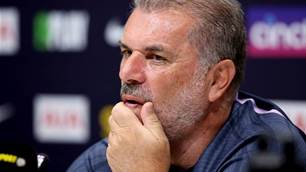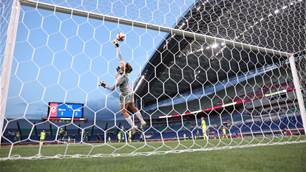Wayne Rooney must wonder.
He would never admit it but he must ponder at times whether he would have become a better player if he had not joined Manchester United.
True, if he had not, he might not now have a Champions League medal to show for his efforts.
But has joining United stunted his development as arguably the most naturally gifted footballer the English game has ever seen?
Have England been deprived of a talent around whom they could have built a tournament-winning team?
They are valid questions after a couple of seasons in which Rooney has struggled to build on his early promise.
And even more so after the admission by United manager Sir Alex Ferguson this week that he might be to blame, partly at least, for Rooney's modest goal output in recent seasons - 18 in all competitions last term.
Ferguson said this week: "I think I have to take a bit of responsibility for it. He's sacrificed himself and never complained about it which says a lot about the lad.
"We kept using him in different positions. We need to define his role better."
At United, Rooney has often been used out wide where his goal threat and his ability to play or collect the decisive short pass at which he is so adept is nullified.
Would you pick Andrew Flintoff for his fielding at third man? No.
But Rooney has continually been asked to curb his own instinctive game to accommodate the free role of Cristiano Ronaldo.
It has paid off handsomely for Manchester United whose Premier League and Champions League double are all the confirmation Ferguson needs.
But for Rooney and for England it is a different story, especially when he is seen charging back towards his own corner flag rather than using his energies in areas of the field more suited to his sublime talent.
Rooney's selfless attitude was praised recently by World Cup winning coach Marcello Lippi.
"What counts in football, even more than the formation, is the philosophy of the game," said Lippi. "It's the desire of the great players to put themselves at the service of the team when their opponents are in possession of the ball. What Rooney does at Manchester."
No-one could doubt Rooney's lung power or his team ethic. The downside is that the back-tracking, wide-hugging Rooney at times has resembled a frustrated shadow of what he might have been.
Remember those first heady days?
That first thunderous drive against Arsenal which announced a special teenage talent. That brilliant hat-trick against Fenerbahce on his debut for United.
There is no doubt about it. When Rooney moved from Everton to Old Trafford in 2004 he was the most luminous talent in English football. The most natural home-bred footballer since Paul Gascoigne.
After his performance in Euro 2004, before his unfortunate broken metatarsal against Portugal, comparisons were drawn with Pele, a thought endorsed by then England manager Sven Goran Eriksson. Rooney was that good. He was expected to get even better.
Instead of being the magical talisman for club and country, however, he has become just another player, a fine one admittedly and one with huge hunger, an impressive work ethic and a bank balance big enough to afford a £2.5million summer wedding.
But not the rare individual he once promised to become, one who could carry an entire team with the quality of his talent.
He would play centre-half for United if required, Ferguson added.
In the 'me, me, me' age of football that is a laudable sentiment. But it is not what English football needs to hear. The centre of attention is Rooney's best position.
************
FIFA president Sepp Blatter guarantees a Great Britain team in the Olympics will not affect the voting rights of the Football Associations of the home countries.
Why should it? It is a tournament for emerging players with a couple of established over-age stars allowed.
Surely bigotry can be put to one side and a GB side formed in the world's most popular sport for London 2012, exactly 100 years since Great Britain won the last of their three Olympic golds in football.
The way things are going it is the only chance any player from Scotland, Wales, Northern Ireland or even England is going to qualify for a major international tournament.
************
For most footballers the only thing worse than being in the spotlight is not being in the spotlight.
Paul Scholes is the exception.
In a one-club career with Manchester United, Scholes has been feted by fans and media alike as one of the club's greatest players. Yet he never runs faster, in the opposite direction, than when he sees a microphone or a camera heading towards him.
He plays football for fun and will don his flat cap and watch his beloved Oldham from the stands when he finally hangs up his boots, which he predicts will be after another two seasons at Old Trafford.
Scholes belongs to another time, the one in which Preston plumber Tom Finney caught the bus to the stadium on match days before entertaining the faithful. Same values. Scholes just gets paid more.
True, if he had not, he might not now have a Champions League medal to show for his efforts.
But has joining United stunted his development as arguably the most naturally gifted footballer the English game has ever seen?
Have England been deprived of a talent around whom they could have built a tournament-winning team?
They are valid questions after a couple of seasons in which Rooney has struggled to build on his early promise.
And even more so after the admission by United manager Sir Alex Ferguson this week that he might be to blame, partly at least, for Rooney's modest goal output in recent seasons - 18 in all competitions last term.
Ferguson said this week: "I think I have to take a bit of responsibility for it. He's sacrificed himself and never complained about it which says a lot about the lad.
"We kept using him in different positions. We need to define his role better."
At United, Rooney has often been used out wide where his goal threat and his ability to play or collect the decisive short pass at which he is so adept is nullified.
Would you pick Andrew Flintoff for his fielding at third man? No.
But Rooney has continually been asked to curb his own instinctive game to accommodate the free role of Cristiano Ronaldo.
It has paid off handsomely for Manchester United whose Premier League and Champions League double are all the confirmation Ferguson needs.
But for Rooney and for England it is a different story, especially when he is seen charging back towards his own corner flag rather than using his energies in areas of the field more suited to his sublime talent.
Rooney's selfless attitude was praised recently by World Cup winning coach Marcello Lippi.
"What counts in football, even more than the formation, is the philosophy of the game," said Lippi. "It's the desire of the great players to put themselves at the service of the team when their opponents are in possession of the ball. What Rooney does at Manchester."
No-one could doubt Rooney's lung power or his team ethic. The downside is that the back-tracking, wide-hugging Rooney at times has resembled a frustrated shadow of what he might have been.
Remember those first heady days?
That first thunderous drive against Arsenal which announced a special teenage talent. That brilliant hat-trick against Fenerbahce on his debut for United.
There is no doubt about it. When Rooney moved from Everton to Old Trafford in 2004 he was the most luminous talent in English football. The most natural home-bred footballer since Paul Gascoigne.
After his performance in Euro 2004, before his unfortunate broken metatarsal against Portugal, comparisons were drawn with Pele, a thought endorsed by then England manager Sven Goran Eriksson. Rooney was that good. He was expected to get even better.
Instead of being the magical talisman for club and country, however, he has become just another player, a fine one admittedly and one with huge hunger, an impressive work ethic and a bank balance big enough to afford a £2.5million summer wedding.
But not the rare individual he once promised to become, one who could carry an entire team with the quality of his talent.
He would play centre-half for United if required, Ferguson added.
In the 'me, me, me' age of football that is a laudable sentiment. But it is not what English football needs to hear. The centre of attention is Rooney's best position.
************
FIFA president Sepp Blatter guarantees a Great Britain team in the Olympics will not affect the voting rights of the Football Associations of the home countries.
Why should it? It is a tournament for emerging players with a couple of established over-age stars allowed.
Surely bigotry can be put to one side and a GB side formed in the world's most popular sport for London 2012, exactly 100 years since Great Britain won the last of their three Olympic golds in football.
The way things are going it is the only chance any player from Scotland, Wales, Northern Ireland or even England is going to qualify for a major international tournament.
************
For most footballers the only thing worse than being in the spotlight is not being in the spotlight.
Paul Scholes is the exception.
In a one-club career with Manchester United, Scholes has been feted by fans and media alike as one of the club's greatest players. Yet he never runs faster, in the opposite direction, than when he sees a microphone or a camera heading towards him.
He plays football for fun and will don his flat cap and watch his beloved Oldham from the stands when he finally hangs up his boots, which he predicts will be after another two seasons at Old Trafford.
Scholes belongs to another time, the one in which Preston plumber Tom Finney caught the bus to the stadium on match days before entertaining the faithful. Same values. Scholes just gets paid more.
Copyright (c) Press Association
Related Articles

Postecoglou looking to A-League to 'develop young talent'
.jpeg&h=172&w=306&c=1&s=1)
Big change set to give Socceroos star new lease on life in the EPL













